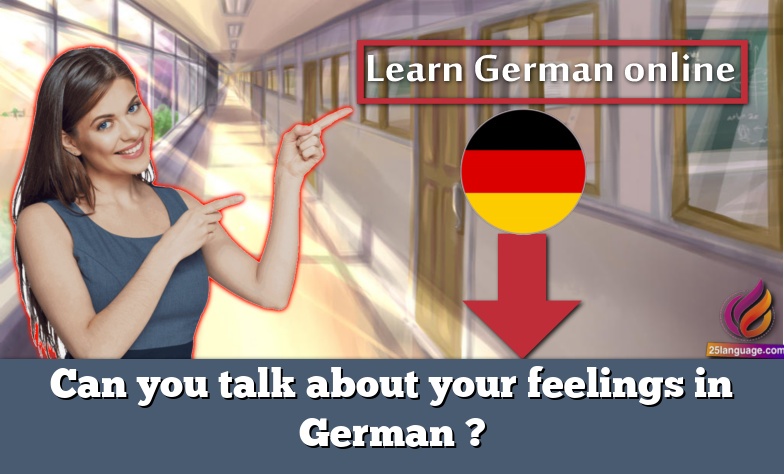Can you talk about your feelings in German ?

Talk About Feelings in German
Most of us don’t even know how to express our feelings in our native tongue, much less in a second language – but don’t worry. We’ll make it very easy for you, so you’ll learn how to talk about your feelings in German using the suitable phrases .
We’ve collected the basic German emotions vocab to help you get started as you learn German . You can find them in the table below . And if German pronunciation is something you struggle with, click on the play buttons to hear how each word is pronounced by a native speaker !
German emotions and feelings Vocab :
| English | German |
| the emotion | die Emotion |
| the mood | die Laune |
| happy | glücklich |
| sad | traurig |
| excited | begeistert |
| the love | die Liebe |
| the hate | der Hass |
| angry | wütend |
| the hope | die Hoffnung |
| depressed | deprimiert |
| lonely | einsam |
| satisfied | zufrieden |
| proud | stolz |
| disappointed | enttäuscht |
| upset | aufgebracht |
phrases you can use to express your different feelings in german :
First , the most common way to express an feelings in German is to use “ich bin” , which means “I am”. Just like in English, all you have to do is add any adjective in front of it! . Read and hear the phrases below as examples :
| I’m excited | Ich bin begeistert |
| I’m angry | Ich bin böse |
| I’m happy | Ich bin glücklich |
Some emotions are better expressed in German using “Mir ist” rather than Ich bin, and that will largely depend on set phrases rather than logic. You’ll get used to them as you practice listening more often. It starts becoming natural after a while!
| I’m bored | Mir ist langweilig |
| I feel sick | Mir ist übel |
“Ich fühle mich” literally means “I feel myself”. However, this expression won’t make sense in German unless you add adjectives in front of it:
| I feel good | Ich fühle mich gut |
| I feel lonely | Ich fühle mich einsam |
“Mir geht’s“… literally translates to “it goes to me…” and is often used to talk about how you’re doing . When somebody asks you what you’ve been up to or how you’ve been lately, you can reply using :
| Mir geht’s gut | literally “It goes to me good”, which means “I’m doing well” |
| Es geht so | Not too bad, doing okay |
You should be really thrilled , because now you can better express yourself and your feelings in German !
As a revision , read and listen to the phrases below :
|
to feel like / want to
|
|||
|
We feel like. / We want to.
|
|||
|
We don’t feel like. / We do’t want to.
|
|||
|
|
|
|
|
|
to be afraid
|
|||
|
I’m afraid.
|
|||
|
I am not afraid.
|
|||
|
|
|
|
|
|
to have time
|
|||
|
He has time.
|
|||
|
He has no time.
|
|||
|
|
|
|
|
|
to be bored
|
|||
|
She is bored.
|
|||
|
She is not bored.
|
|||
|
|
|
|
|
|
to be hungry
|
|||
|
Are you hungry?
|
|||
|
Aren’t you hungry?
|
|||
|
|
|
|
|
|
to be thirsty
|
|||
|
They are thirsty.
|
|||
|
They are not thirsty.
|
|||
|
|
|
|
|





























